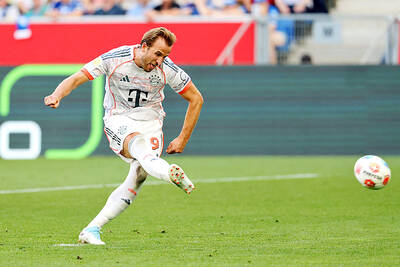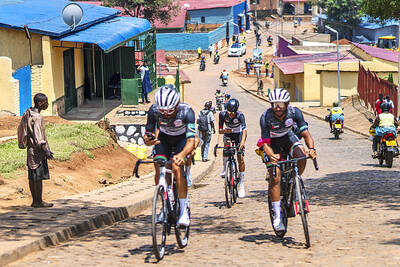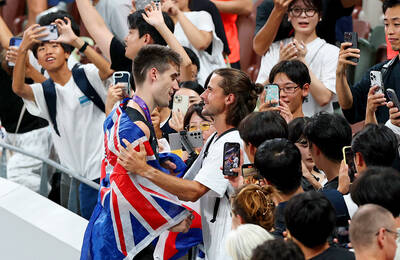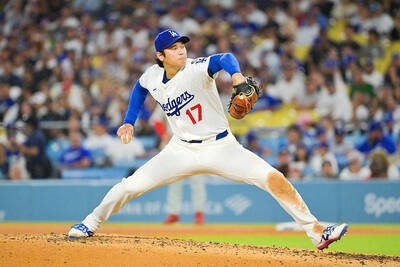With the World Cup finals in South Africa only a few months away, World Cup fever is picking up around the globe.
Even in Taiwan the event will attract a devout following, but contemplating the day when the national team actually makes it to soccer’s biggest event is an entirely different story.
Local soccer experts agree that funding, culture and a proper structure are the keys to developing the sport in Taiwan, where the game has long struggled to gain a foothold.
The foremost goal is to create a “soccer culture,” which has been nonexistent in a nation far more passionate about basketball and baseball, said Lin De-jia, secretary-general of the Chinese Taipei Football Association (CTFA).
Without a professional league and a soccer culture, children don’t have the motivation to participate in the sport, Lin said.
It’s not a secret that Taiwan, currently ranked 162nd in the world, has long been an international soccer minnow, registering five wins, five draws and 41 losses in World Cup qualifying matches from 1958 to this year. The team has scored only 28 goals in those games, while surrendering 182.
Led by Japanese head coach Toshiaki Imai, Taiwan’s World Cup qualifying campaign for this year’s finals quickly evaporated in October 2007 when Uzbekistan defeated them by an aggregate 11-0 scoreline.
In order to change its lowly status, Taiwan needs to focus on developing its youth soccer programs, said Frenchman David Camhi, who is familiar with Taiwanese soccer and has been running a training camp for children in Taipei with some friends for six years.
All training and competitions take place within the education system, based on the US model, as was the case in Japan in the late 1980s and early 1990s, Camhi wrote in Kick-Off magazine, and he argues it is the wrong approach.
“Japan now has three professional leagues, nine regional leagues, 46 prefecture leagues and many more municipal leagues. A football pyramid with eight levels,” Camhi wrote.
With such a structure in place, Japan managed within approximately 12 years to progress to the second round of the FIFA World Cup finals in 2002 and to qualify in 2006 and this year.
“It’s something the football authorities and other sporting bodies in Taiwan should look into,” he wrote.
When there is a much larger talent pool, the overall competitive level of the sport will be elevated, said Camhi, who arrived in Taiwan in 1999 and has been working on promoting and teaching the game to children since that time.
Other than the lack of a professional league, funding has also been a problem, Lin said.
“Taiwan’s government sees the CTFA as nothing more than one of more than 60 sports associations in the country,” he said.
Lin said the association previously received NT$10 million (US$312,000) in funding from the government each year, but that amount dropped to NT$6 million last year. That’s a pittance compared with the NT$30 million the CTFA spends to send teams, ranging from under-13 to the senior level, abroad to play in 20 to 30 international competitions each year, Lin said.
He does acknowledge that there have been some sparks of interest over the past decade, including after the 2002 World Cup in Japan and South Korea when Taiwanese passion for soccer did pick up a little.
Since then, Lin said, more schoolchildren have participated and more schools have organized teams, enabling the nation’s youth teams to fare better in competitions.
Camhi said a number of elite young Taiwanese players are even capable of playing professionally now, though because they lack exposure they are not recruited by European or South American clubs.
Both Lin and Camhi acknowledge that the development of the local game will take a long time and requires patience.
Lin urged the government to plan for the long-term rather than rush for immediate results and he urged officials to rethink their policy of establishing “sports classes” — which gather the best athletes into a single class — because it works against achieving the long-term objective.
Such classes actually limit participation in sports and discourages schools without sports classes from organizing teams because they cannot compete with the better schools, he argued.
That’s not good because the future is the younger generation, Camhi said. Only by working from the bottom up can Taiwan improve its performance and some day “reach my ultimate goal for Taiwan — to qualify for the World Cup,” he said.

DOUBLE: Harry Kane has now netted 12 goals in six games, scoring his second hat-trick this season after Bayern’s opening Bundesliga match against Leipzig last month That man again. Harry Kane scored his second hat-trick of the season on Saturday to steer Bayern Munich to a 4-1 win at Hoffenheim for the best Bundesliga start any team has made after four rounds. The England captain scored before the break and converted two penalties after it to take his club tally to 12 goals in six games across all competitions — 13 goals in seven games including the German Supercup. Kane’s other hat-trick was in the Bundesliga-opening 6-0 rout of Leipzig. Bayern’s record of 12 points with a goal difference of 15-plus is the best after four rounds of the Bundesliga

Rwanda is to take center stage from today as the first African country to host the cycling world championships, in its latest use of sports to improve the country’s reputation. As it prepares for 5,000 cyclists and 20,000 spectators, Rwanda has spruced up its roads, created a network of cycle lanes and run multiple police drills. A poor, landlocked country in east Africa still widely associated with a horrific genocide in 1994, Rwanda has used various sports to revamp its image, attract tourists and impress investors with its organizational efficiency. It has spent lavishly on soccer sponsorship deals with clubs

New Zealand yesterday basked in “amazing” athletics glory after winning two gold medals in as many days at the World Athletics Championships in Tokyo. Geordie Beamish on Monday claimed New Zealand’s first track gold in history with a shock victory in the 3,000m steeplechase, while high jumper Hamish Kerr followed with gold on Tuesday to make it an unprecedented double success for a country much better known for rugby than its prowess in track and field. Before this week, the country had won only six golds in total at the championships. Yesterday morning New Zealand were in the giddy position of fourth on

After Shohei Ohtani on Tuesday pitched five hitless innings for the Los Angeles Dodgers, the Philadelphia Phillies’ Rafael Marchon hit a tiebreaking, three-run homer off Blake Treinen with two outs in the ninth inning for a 9-6 win. Brandon Marsh had a two-run homer and Max Kepler added a solo shot in a six-run sixth for Philadelphia. Ohtani’s 50th homer leading off the eighth helped the Dodgers tie the game 6-6. The Phillies erased a 4-0 deficit against Justin Wrobleski in another stunning collapse by the Dodgers bullpen. Philadelphia rallied for four runs in the seventh and eighth innings and another in the